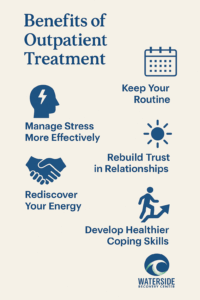There’s a certain kind of exhaustion that doesn’t show on the outside. You still make it to work. You still show up for your family. You might even be doing pretty well, career-wise. But inside? It feels like you’re permanently stuck in survival mode—counting hours, counting drinks, counting how long you can keep this juggling act going.
At Waterside Recovery’s outpatient treatment program, we see it all the time. People who function on paper but feel like they’re barely keeping their head above water. This blog is for you—if you’re wondering whether you “really need help,” or whether life could feel easier than it does right now.
You don’t have to wait for everything to crash. Outpatient treatment is designed for people exactly like you—people who are ready to stop just surviving and start actually feeling okay.
Surviving Isn’t Success—It’s a Warning Sign
High-functioning doesn’t mean healthy. You might have avoided the typical “rock bottom,” but you’ve likely sacrificed something else: peace of mind.
Most people who come to outpatient treatment programs admit they’ve been:
- White-knuckling their way through most days.
- Living with constant low-level anxiety about being “found out.”
- Feeling emotionally flat, disconnected, or irritable.
- Numbing through drinking, scrolling, or zoning out just to get through the evening.
If life feels like a never-ending loop of perform-repeat-hide, that’s not success. That’s survival mode. And it’s optional.
Outpatient Treatment Lets You Keep Your Life—While Rebuilding It
You don’t need to disappear from your life to get help. That’s the beauty of an outpatient treatment program. You stay connected to your responsibilities—work, family, school—while getting structured, professional support several days a week.
At Waterside Recovery, our outpatient model is built for:
- Flexibility that accommodates your schedule.
- Deep clinical support without the pressure of 24/7 inpatient care.
- Immediate practice of new skills in real-life situations.
You don’t press pause on life. You start changing how you show up in it—right away.
You Learn How to Be Present—Not Just Numb
You probably got really good at numbing. Maybe it started with happy hours, then turned into nightly drinking or secret coping routines. Outpatient treatment helps you reverse that cycle without being flooded by feelings you can’t handle.
Through a balance of group therapy, individual counseling, and skill-building sessions, you’ll:
- Identify the actual triggers that keep you stuck.
- Practice healthier responses to stress without defaulting to substances.
- Learn how to actually experience your life, not just escape from it.
This isn’t about being forced into “positivity.” It’s about feeling more you—steadier, calmer, clearer.
You Handle Stress—Without It Handling You
Stress isn’t going anywhere. But in outpatient care, you get tools that actually work in your busy, complicated life:
- Setting boundaries that don’t make you feel guilty.
- Managing difficult conversations without avoiding them.
- Learning to pause before reacting.
Most importantly, you stop living like every moment is a tightrope walk. You create mental space to breathe, think, and respond—without needing to drink or use to get through the day.
You Start Repairing Relationships—Without the Guilt Loop
Maybe people around you don’t see the whole picture. Or maybe they do, but they’re too tired to keep bringing it up. Outpatient treatment helps you:
- Rebuild trust in practical, doable steps.
- Learn healthier communication patterns.
- Stop the cycle of apology, repeat behavior, apology again.
Over time, relationships stop feeling like a performance—and start feeling like connection again.
You Reconnect with Things That Actually Fill You Up
When you’ve been in survival mode long enough, you forget what real enjoyment feels like. One surprising part of outpatient treatment is how quickly you can reconnect with things that make you feel alive:
- Hobbies you dropped during the drinking years.
- Time outside that actually feels good.
- Energy you forgot your body could have.
Many people in outpatient care describe it like seeing color again after years of grayscale living. It’s not magic—but it is possible.
Outpatient Treatment Helps You Catch the Fall Before It Happens
One of the biggest myths in addiction is that you have to “lose it all” before getting help. You don’t. Outpatient treatment is for people who want to catch the spiral before it gets worse. You can interrupt the pattern while your life is still intact—and make it genuinely better, not just tolerable.
Frequently Asked Questions (FAQs)
What is an outpatient treatment program, exactly?
Outpatient treatment offers structured therapy and addiction support without requiring you to live on-site. You attend scheduled sessions during the week and return home afterward. At Waterside Recovery, outpatient care is personalized around your schedule and life needs.
How many hours per week will I need to commit?
It depends on your specific program. Many people attend 3–5 sessions a week, ranging from 2 to 5 hours each. We work with you to design a treatment plan that doesn’t derail your professional or family responsibilities.
Can I keep working while in outpatient treatment?
Yes, most of our clients continue working while in outpatient care. We offer flexible scheduling options so you can balance recovery with career obligations.
What if I don’t think my drinking or using is “bad enough”?
If you’re asking the question, there’s probably a reason. Outpatient treatment is ideal for people who don’t fit the stereotypical image of addiction but know something isn’t right. You don’t have to hit rock bottom to deserve help.
Is outpatient treatment confidential?
Absolutely. All services at Waterside Recovery are confidential, and we respect your privacy at every stage. Your participation won’t be shared with employers, friends, or family unless you choose to include them.
You Deserve More Than “Barely Managing”
High-functioning isn’t the goal. Peace, clarity, and honest connection—that’s the goal. You don’t have to wait until something breaks to decide you’re done surviving. You can stop the quiet spiral now and build a life you actually enjoy showing up for.
Call (866)671-8620 or visit Contact Us to learn more about our outpatient treatment program services in Plymouth County, MA. Let’s help you go from holding it together to actually feeling okay—and then better than okay.



